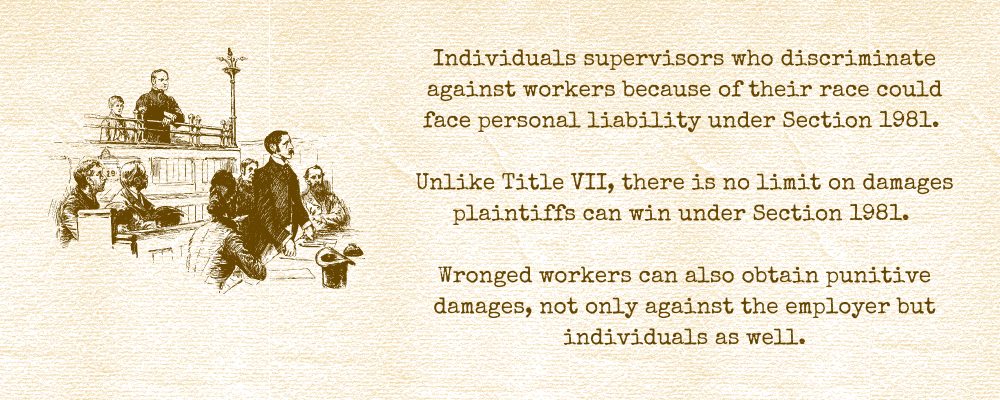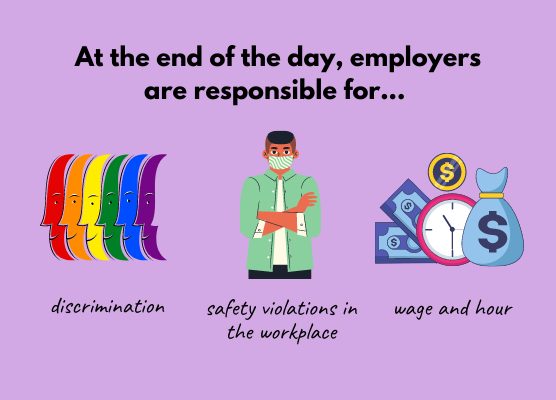Remind bosses: Reckless behavior can bring personal liability
Federal laws permit employees to sue their discriminating, cheating, or negligent employers. A few laws also let employees go after a manager or supervisor’s personal assets. Additionally, state laws may differ substantially from federal laws in terms of liability caps and managerial/supervisory liability.
The U.S. Department of Labor (DOL) enforces the Fair Labor Standards Act (FLSA) and the Family and Medical Leave Act (FMLA). The FLSA and FMLA both allow personal liability claims in some cases. Another DOL-enforced law, the Occupational Safety and Health Act (OSHA), permits the DOL to sue individuals under certain circumstances.
Title VII of the Civil Rights Act does not permit personal liability, but clever plaintiffs’ lawyers have found a workaround. U.S. Code part 42 Section 1981 first became law under the Civil Rights Act of 1866. That law sought to protect the rights of recently freed slaves to contract on the same terms as white men. Section 1981 includes the right to sue anyone who interferes with the plaintiff’s ability to contract because of race.
Managers and supervisors are not working with a net. At the end of the day, employers are responsible for discrimination, wage and hour, and safety violations in the workplace. Particularly reckless managers and supervisors could be personally liable as well.
Personal wage and hour liability
The FLSA defines an employer as “any person acting directly or indirectly in the interest of an employer in relation to an employee.” The keyword is person. Anyone from the person setting schedules to a manager administering tip distribution could be an employer under the FLSA.
Overtime calculations are at the heart of many FLSA claims. Simple misinterpretations of the law seldom lead to punitive damages. In those cases, the employer simply pays the workers what they are owed. The problem is fixed. Everyone gets back to work.
However, cases, where employers falsify time records or pay employees under the table, are different. These are willful violations and wronged employees are entitled to double damages.
Courts will examine who is:
- responsible for day-to-day operations;
- sets employee schedules;
- determines rates of pay; or
- has the ability to hire and fire.
This analysis is often called the “Economic Realities” test. Plaintiffs do not have to establish all of the factors. Courts will make a judgment as to who actually controls the employee’s work, scheduling, and pay when deciding.
In one case, employees filed suit over a disagreement on how time clock entries were rounded. The court decided the employee handbook was a smoking gun. The supervisor who wrote the rounding policy had day-to-day responsibilities deeply involved with company operations. When he moved to be removed from the lawsuit, the court refused
Personal FMLA liability
Although less common, some managers or supervisors may face liability under the FMLA. Courts generally use the same “economic realities” test here as well. Managers who control employee scheduling can be particularly exposed under this concept.
In one case, an employee sought intermittent FMLA leave to care for two sons who needed medical care. She and her supervisor entered into a lengthy email discussion over the medical certifications needed. The supervisor continued to claim the FMLA paperwork was deficient but would not specify what was missing. Frustrated, the employee retained an attorney. The employer gave a deadline for the paperwork. She missed it and was fired.
She sued the employer and the supervisor personally. The supervisor sought to be released from the suit because he lacked hiring/firing authority. The federal appeals court noted that while that was technically true, the economic realities were different. The employer’s CEO was the only one with unfettered hiring/firing authority. The court noted though, that the CEO never questioned the supervisor’s version of events and did not investigate the firing. The court concluded the supervisor had the real power to fire the employee. The individual liability case proceeded to trial.
Personal OSHA liability
Individuals can face personal liability under OSHA in limited cases. For example, corporate officers or directors can face criminal charges for workplace employee deaths. The violation must have been willful.
Supervisors who have no ownership interests in the company are not liable under OSHA. However, they may be under state law. For example, two managers faced criminal sanctions under California state law for a worker fatality. The plant director plea-bargained a felony charge down to a misdemeanor conviction. He agreed to 320 hours of community service, $11,400 in fines, and safety training. The plant’s former safety officer faces three years of probation, safety training, and $19,000 in fines. His felony conviction will be reduced to a misdemeanor after he serves his sentence.
Personal liability under OSHA most commonly occurs when individuals interfere with investigations. Employers who intimidate potential whistleblowers or retaliate against them violate OSHA. Individual supervisors who do the employer’s dirty work could face personal liability. There is no private right to action under OSHA, but the DOL can file civil charges against individual supervisors.
Personal Section 1981 liability
Individuals supervisors who discriminate against workers because of their race could face personal liability under Section 1981. Unlike Title VII, there is no limit on damages plaintiffs can win under Section 1981. Wronged workers can also obtain punitive damages, not only against the employer but individuals as well.
In order to state a claim under Section 1981, a plaintiff must plead sufficient facts in support of the following elements:
- plaintiff is a member of a racial minority;
(2) the defendant intended to discriminate on the basis of race; and
(3) defendant’s discrimination concerned the right to make and enforce contracts among other rights.
Defendants can win a Section 1981 lawsuit by proving:
- purposeful racial discrimination;
- a hostile work environment based on racial harassment; or
- retaliation
The plaintiffs do not have to be the employee’s direct supervisor to be sued under Section 1981. Any person who interferes with the plaintiff’s ability to make or enforce contracts because of race is liable. Courts have consistently ruled that at-will employment meets the statute’s definition of a contract.
A supervisor who receives a complaint of racial discrimination and does not investigate it may run afoul of Section 1981 as well. In one Pennsylvania case, the court ruled “ A manager’s deliberate indifference to … racially-motivated conduct” was sufficient.
 Workers Compensation
Workers Compensation
Workers Compensation is generally considered the “exclusive remedy” for all workplace injuries or illnesses. However, some states permit injured employees to pursue litigation against a supervisor under some circumstances. Supervisors who engage in some sort of misconduct that results in the injury may face litigation. Similarly, supervisors who are acting in a separate capacity from their supervisor position may be liable.
Laws in 32 states and the District of Columbia state that supervisors whose intentional conduct causes injury can be liable. In five states, the standard is “grossly negligent” behavior. The standard is “willful, wanton, or recklessly negligent” in three states. Nine states do not address the issue in their laws.
Immigration laws
From reviewing I-9 formwork authorization documents to making hiring decisions, first-line supervisors face personal liability danger. DHS does not expect supervisors to be forgery experts – but neither should they look the other way when warranted. Allowing an obviously forged document to be used or worse – helping procure it – will backfire. For example, following a workplace raid in Tennessee, the owner and two-floor supervisors were criminally charged. The first tipoff was a bank telling the IRS the company was withdrawing large amounts of cash. It turned out the company and floor supervisors were paying undocumented workers in cash. The owner served 18 months in federal prison while the supervisors received probation.
In addition, upper-level management should have clear directives for hiring managers to follow all immigration laws. Those managers may feel pressured to hire, especially if they earn bonuses based on meeting labor needs. By making it clear the company wants to follow the law, it’s less likely they will be held liable even if the manager is.
Personal liability as an attention-getting device
To be honest, a lot of Human Resource training is pretty snooze-worthy. However, when the subject is the employee’s wallet, training suddenly gets interesting. If you warn employees that errors may hit them personally in the pocketbook or even result in criminal liability, you will get their attention. You may even suggest that they consider getting individual liability coverage for workplace errors and omissions. Having employees who take anti-discrimination tenets to heart benefits them as well as the employer.







